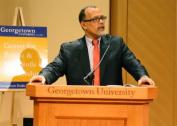
Dean Edward Montgomery speaks about the role and power of philanthropy in Non-profit leadership
—
“Yes, but….” was the answer from a group of scholars and experts who gathered Feb. 29 at Georgetown University for the 15th Waldemar A. Nielsen Issue Forum on Philanthropy.
The Forum is the work of the Public Policy Institute’s Center for Public and Nonprofit Leadership, which uses it as an educational tool, not just for students but for the broader community. (This Forum was produced in partnership with the Institute for the Study of Diplomacy at the Walsh School of Foreign Service.)
“We are fortunate to attract some of the best thinkers in the field,” said Kathy P. Kretman, the Center’s director, “and their conversations, with very different perspectives, challenge our audiences to wrestle with some of the big questions of the day.”
The big question on the table in February was the role of philanthropy in global social change. The challenges the world confronts today, said Dr. Edward Montgomery, dean of the Public Policy Institute, are being tackled by philanthropy as well as government.
Global philanthropy’s resources are growing, with “mega-philanthropies” such as the Gates Foundation making huge investments abroad. Consider the recent gift of $750 million to The Global Fund to Flight Aids, Tuberculosis and Malaria, noted Dr. Stanley Katz, Princeton University Professor of Public and International Affairs. Meanwhile, new philanthropic investors are emerging, said, Raymond C. Offenheiser, president of Oxfam America, citing sovereign wealth funds, pension funds, Islamic philanthropies and emerging foundations in China, India and Brazil.
In a time of great change, it is important that philanthropy not become separated from people in need, said Kavita N. Ramdas, former president and CEO of the Global Fund for Women and the 2012 Waldemar N. Nielsen Fellow. Today’s world, she said, is increasingly unequal.
Offenheiser agreed. “Poverty is not about markets but about exclusion and social rights,” he said. “Philanthropy must get a grip on global poverty and quit picking at the edges.”
Effecting substantive change will require strategic shifts by philanthropy, said Lisa Mensah, executive director of the Initiative on Financial Security at The Aspen Institute. Philanthropy, too often, relies on information and reports to stimulate change. Philanthropy needs to act, and it needs to build sustainable infrastructure — change that has the capacity to continue after the funder has stepped away.
It is messy work, she said, that is hard to evaluate, which adds to the accountability pressures on boards that decide how funds are spent.
“Philanthropy must become more comfortable with its role as a public actor with a point of view,” said Offenheiser, adding it is important to build institutions and leaders willing to take a “rights-based” approach to the work rather that the traditional charitable approach.
It is this type of challenging dialogue that has made the Nielsen Forums so successful, Kretman said, and makes them particularly relevant to the Center’s task. “We not only hear from leaders in our sector, but what we learn informs our thinking and equips us to be better leaders ourselves, whether we are just entering the field, or veterans of many years.”
Image courtesy of Bisnow media, http://www.bisnow.com/